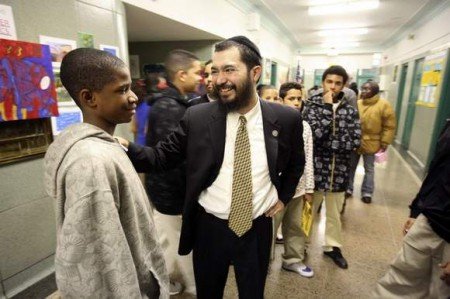|
|

|
The Relationship School
by David Brooks, The New York Times
|
Usually when you visit a school you walk down a quiet hallway and peer in the little windows in the classroom doors. You see one teacher talking to a bunch of students. Every 50 minutes or so a chime goes off and the students fill the hallway and march off to their next class, which is probably unrelated to the one they just left.
When you visit The New American Academy, an elementary school serving poor minority kids in Crown Heights, Brooklyn, you see big open rooms with 60 students and four teachers. The students are generally in three clumps in different areas working on different activities. The teachers, especially the master teacher who is floating between the clumps, are on the move, hovering over one student, then the next. It is less like a factory for learning and more like a postindustrial workshop, or even an extended family compound.
The teachers are not solitary. They are constantly interacting as an ensemble. Students can see them working together and learning from each other. The students are controlled less by uniform rules than by the constant informal nudges from the teachers all around.
The New American Academy is led by Shimon Waronker, who grew up speaking Spanish in South America, became a U.S. Army intelligence officer, became an increasingly observant Jew, studied at yeshiva, joined the Chabad-Lubavitch movement, became a public schoolteacher and then studied at the New York City Leadership Academy, which Mayor Michael Bloomberg and the former New York Schools chancellor, Joel Klein, founded to train promising school principal candidates.
Just another average résumé.
At first, he had trouble getting a principal’s job because people weren’t sure how a guy with a beard, kippa and a black suit would do in overwhelmingly minority schools. But he revitalized one of the most violent junior high schools in the South Bronx and with the strong backing of both Klein and Randi Weingarten, the president of the teachers’ union, he was able to found his brainchild, The New American Academy.
He has a grand theory to transform American education, which he developed with others at the Harvard School of Education. The American education model, he says, was actually copied from the 18th-century Prussian model designed to create docile subjects and factory workers. He wants schools to operate more like the networked collaborative world of today.
He talks fervently like a guerrilla leader up in the mountains with plans to take over the whole country. For the grandly titled New American Academy, he didn’t invent new approaches, as much as combine ones from a bunch of other schools.
Like the Waldorf schools, teachers move up with the same children year after year. Like Hogwarts, students are grouped into Houses. Like Phillips Exeter Academy, students are less likely to sit at individual desks than around big tables or areas for teacher-led discussions.
The students seem to do a lot more public speaking, with teachers working hard to get them to use full sentences and proper diction. The subjects in the early grades (the only ones that exist so far) are interdisciplinary, with a bias toward engineering: how flight, agriculture, transportation and communications systems work. The organizational structure of the school is flattened. Nearly everybody is pushed to the front lines, in the classroom, and salaries are higher (master teachers make $120,000 a year).
The New American Academy takes a different approach than the other exciting new education model, the “No Excuses” schools like Kipp Academy. New American is less structured. That was a problem at first, but Waronker says the academy has learned to get better control over students, and, on the day I visited, the school was well disciplined through the use of a bunch of subtle tricks.
For example, even though students move from one open area to the next, they line up single file, walk through an imaginary doorway, and greet the teacher before entering her domain.
The New American Academy has two big advantages as a reform model. First, instead of running against the education establishment, it grows out of it and is being embraced by the teachers’ unions and the education schools. If it works, it can spread faster.
Second, it does a tremendous job of nurturing relationships. Since people learn from people they love, education is fundamentally about the relationship between a teacher and student. By insisting on constant informal contact and by preserving that contact year after year, The New American Academy has the potential to create richer, mentorlike or even familylike relationships for students who are not rich in those things.
It’s too soon to say if it will work, especially if it’s tried without Waronker and the crème-de-la-crème teachers he has recruited, but The New American Academy is a great experiment, one of many now bubbling across the world of education.
|
|
|
|
|
